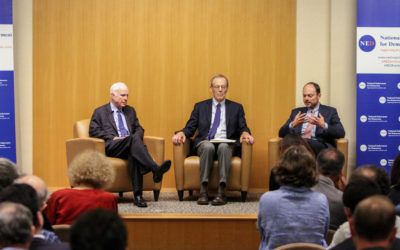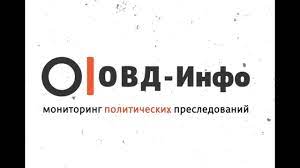
Vladimir Kara Murza (right) with former NED President Carl Gershman (center) and Senator John McCain
The arrest of leading Russian opposition figure Vladimir Kara-Murza highlights the threat to democracy and civil society activists.
His case is an instance of ‘classic’ repression, according to Le Monde, a ‘routine litany’ characteristic of authoritarian regimes that the ‘special military operation’ against Ukraine has only accelerated.
An outspoken critic of the Kremlin, Kara-Murza is a longtime colleague of the late Russian opposition leader Boris Nemtsov, who was assassinated in 2015, the National Endowment for Democracy (NED) reports. An active leader in Russia’s human rights movement and opposition politics, he was host of a weekly program on the now-closed Echo of Moscow radio station and is a regular contributor to The Washington Post, among other top publications.
“Twice have the Russian authorities tried to kill my husband for advocating for sanctions against thieves and murderers, and now they want to throw him in prison for calling their bloody war a WAR,” Kara-Murza’s wife Evgenia said on Twitter. “I demand my husband’s immediate release!”
 NED President and Chief Executive Officer Damon Wilson describes his last conversation with Kara-Murza before returning to Russia in April 2022.
NED President and Chief Executive Officer Damon Wilson describes his last conversation with Kara-Murza before returning to Russia in April 2022.
“He explained his decision to return home by citing a woman who was one of seven participants on Red Square protesting the August 1968 invasion of Czechoslovakia. She told [Kara-Murza] her reasoning: ‘A nation minus even one person is no longer an entire nation. A nation minus me is not an entire nation … So they could no longer say that there was nationwide approval in the Soviet Union for the invasion of Czechoslovakia.’”
More than 150 Russian journalists have left the country, according to the independent news site Agentstvo, fearing that they could be targeted under new Russian laws that carry up to 15 years imprisonment for spreading “fake” news about the Russian military, note Foreign Policy’s Amy Mackinnon and Robbie Gramer:

Meduza
In practice, the laws would likely be applied to journalists who present factual coverage of the war, where the Russian advance in Ukraine’s north all but disintegrated in the face of poor military training and fierce resistance from outmanned and outgunned Ukrainians. With the country’s last remaining independent news sites blocked or forced to suspend their operations entirely, many are now trying to figure out how to continue their operations in exile from abroad.
 Over 15,000 citizens have been arrested for participating in anti-war demonstrations in 150 cities across Russia, according to the latest statistics from human rights group OVD-Info. “Since starting this war, the Russian government has gone to extreme lengths to silence anti-war voices,” explains Dylan Myles-Primakoff, a regional expert and senior manager of the Eurasia program at NED. “In the first month of the war, over 60 Russians—including activists, journalists, and ordinary citizens—were charged under a new law that makes even publicly acknowledging Russia’s military aggression in Ukraine a crime that’s punishable by up to 15 years in prison. Despite these risks, brave Russians such as Vladimir Kara-Murza continue to speak out for peace and deserve all possible support and solidarity.”
Over 15,000 citizens have been arrested for participating in anti-war demonstrations in 150 cities across Russia, according to the latest statistics from human rights group OVD-Info. “Since starting this war, the Russian government has gone to extreme lengths to silence anti-war voices,” explains Dylan Myles-Primakoff, a regional expert and senior manager of the Eurasia program at NED. “In the first month of the war, over 60 Russians—including activists, journalists, and ordinary citizens—were charged under a new law that makes even publicly acknowledging Russia’s military aggression in Ukraine a crime that’s punishable by up to 15 years in prison. Despite these risks, brave Russians such as Vladimir Kara-Murza continue to speak out for peace and deserve all possible support and solidarity.”







